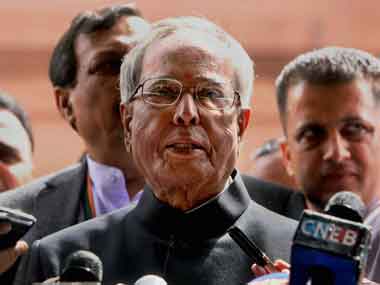In the Grimms fairy tale centred around the life of Snow White, the vain Queen goes into a fit of rage when the magical mirror on her wall tells her that she is no longer the fairest of ’em all. But even she, in all her vanity, acknowledges the verity of the mirror’s brutally honest message, and goes about trying to remedy the situation by dealing with the bothersome princess.
But in the fairy tale world that our economic policymakers inhabit, the mirror that tells them the bald truth about the economy has become the target of criticism for having distorted the “reality” as it exists in their imagination.
On Monday, the rating agency Fitch flagged the risks building up in India’s macro-economy and lowered its rating outlook, citing persistent failure to initiate measures to address structural deficiencies and the incapacity of the government to break the policy deadlock.
[caption id=“attachment_347474” align=“alignright” width=“380” caption=“The excessive preoccupation with rubbishing rating agencies is wasteful. PTI”]
 [/caption]
[/caption]
Fitch’s message merely reflects the validated reality that even economists at home and distinguished captains of industry, who are not readily given to bad-mouthing the government, have pointed to in recent times.
It also echoes the similar sentiment that another rating agency, Standard & Poor’s, gave voice to last week when it pointed to the serious risk of a rating downgrade of India to ‘junk’ status if critical failings in the macroeconomic fundamentals weren’t remedied soon enough. S&P’s additionally pointed to the power imbalance between Sonia Gandhi and Manmohan Singh as lying at the root of the problem ( More on that here .)
As Firstpost had noted earlier ( here ), you don’t really need the rating agencies to know which way the economic wind is blowing.
Yet, the government’s response, in every case, has been to curse the mirror for reflecting a reality that doesn’t tally with its own perception of it.
Finance Minister Pranab Mukherjee, who is now merely marking time before he heads off for a sinecure at the Rashtrapati Bhavan, claimed that Fitch had failed to take note of “recent structural reforms” and that much of its observations onIndia’s weak public finances, economic growth potential and inflationary pressures, were based on “earlier data”.
Similarly, Mukherjee had only last week “rejected” S&P’s threat of a ratings downgrade, claiming that the agency’s observations did not reflect the fundamental soundness of the Indian economy.
Chief economic adviser Kaushik Basu too discounted Fitch’s observations, which he said merely reflected the “herd mentality” of ratings agencies.
And last week, after Wipro chairman Azim Premji and Infosys founder NR Narayana Murthy gave their downbeat assessment of the state of the Indian economy , and the marked absence of a meaningful leadership, Congress lackeys went to town criticising them , rather than acknowledging the reality that they reflected.
All of these exertions reflecting a disconcerting tendency to target the messenger, rather than deal with the message that they bear: that the Indian economic engine is sputtering, for which policy gridlock and the incapacity of the government to initiate meaningful reforms is largely to blame.
In talking down Fitch’s observations, Mukherjee scored a spectacular self-goal of sorts by pointing to some of the reforms that the government had undertaken in recent times: among other initiatives, he listed the move to cap subsidies, which he announced in Budget 2012, the effort to reform fertilizer subsidy, the new manufacturing policy that the government unveiled, and the promise of improved service delivery through the Unique ID project.
The irony is that these “reform” efforts haven’t made much progress, and in any case haven’t made a meaningful contribution to addressing the macro-economic structural failings. If anything, Mukherjee has repeatedly blown his budget and overshot his subsidies, making a mockery of his claims - to the extent that the government’s credibility about the numbers it puts out stands on slippery ground.
Ahead of Budget 2012, economist Jim Walker had told Firstpost( here ) that given the government’s"appalling" track record in failing to meet its fiscal consolidation targets, “the likelihood is that they are going to disappoint again in the budget by making assumptions that are not going to be fulfilled.”
The government had already lost credibility from the previous year’s unrealistic assumptions, and if it didn’t do much better in 2012, “we could see a pretty significant market selloff,” Walker had said then.
Barely three months after Mukherjee’s Budget, his numbers and assumptions have already been had to be junked, which is the reality that the markets - and rating agencies - are reflecting today.
And as for Kaushik Basu, even he had not long ago blurted out the reality that he denies today: that reforms have stalled, and that no meaningful progress could be expected until after the 2014 elections. Of course, after his comments set off shockwaves in the government, he subsequently toned down his remarks, and in recent times, has been talking down the “pessimism spiral” in commentaries about the Indian economy.
In other words, it’s the mirror that lies.
This preoccupation with the mirror image, and with cursing the mirror for what it depicts, is entirely wasteful.If our economic policymakers spent half as much time and energy addressing the core problems in the economy that they themselves acknowledge exist, they might not have to worry so much about the bothersome image.
Venky Vembu attained his first Fifteen Minutes of Fame in 1984, on the threshold of his career, when paparazzi pictures of him with Maneka Gandhi were splashed in the world media under the mischievous tag ‘International Affairs’. But that’s a story he’s saving up for his memoirs… Over 25 years, Venky worked in The Indian Express, Frontline newsmagazine, Outlook Money and DNA, before joining FirstPost ahead of its launch. Additionally, he has been published, at various times, in, among other publications, The Times of India, Hindustan Times, Outlook, and Outlook Traveller.
)